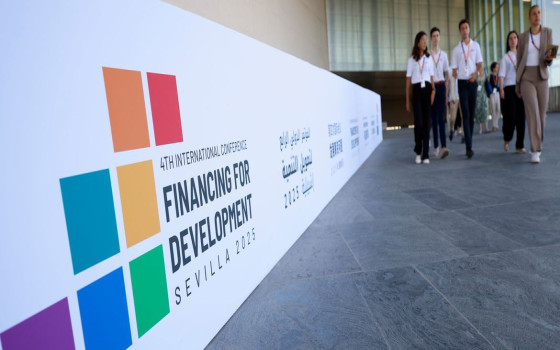
Unleashing New Financing Solutions to Revive Sustainable Development: Key Outcomes from the Seville International Conference on Financing for Development

- Europe and Arabs
- Friday , 4 July 2025 12:41 PM GMT
Seville - New York: Europe and the Arabs
The historic Seville Financing for Development Conference concluded Thursday with a renewed sense of resolve and focus on action that can transform the lives of people around the world, according to UN Deputy Secretary-General Amina Mohammed.
“The human consequences of rising debt burdens, escalating trade tensions, and sharp cuts in official development assistance were clearly highlighted this week,” Mohammed said at the conference’s closing session.
Multilateralism in Action
The conference delivered a strong response in the form of a consolidated, solutions-focused outcome document that reaffirms the Addis Ababa commitments made a decade ago, which seeks to “rekindle the spirit of hope” through the Sustainable Development Goals and demonstrates that multilateral cooperation remains important and still works, Ms. Mohammed said.
The Deputy Secretary-General welcomed the commitment of host country Spain to help launch the new UN Seville Debt Forum, describing it as a crucial step in helping countries better manage and coordinate debt restructuring efforts. Carlos Cuerpo, Spanish Finance Minister, said at the closing press conference: “Seville will not be remembered as a landing zone, but as a starting point for action, to improve the livelihoods of people around the world. We sent a strong message of commitment and confidence in multilateralism, which can deliver tangible results to put sustainable development back on track.”
Li Junhua, UN Under-Secretary-General for Economic and Social Affairs and Secretary-General of the Conference, said the week demonstrated that the United Nations is “more than just a space for dialogue; it is a powerful platform for life-changing solutions.”
Li Junhua concluded: “In Seville, we demonstrated our collective will to address the most pressing and complex financing challenges of our time.”
A Concrete Action Plan
Amina Mohammed said at the closing press conference that delegates had made a “serious and long-overdue attempt to address the debt crisis” as they aim to close the massive financing gap for the 2030 Sustainable Development Goals. She emphasized the three key areas of action for the “Seville Commitment”:
A major investment push to close the financing gap for the SDGs. Concrete steps to address unsustainable debt burdens.
Giving developing countries a greater voice in global financial decision-making.
Alongside this agreement, more than 100 new initiatives were launched under the Seville Platform for Action. These include a global debt swap hub, a Debt Suspension Alliance, and a solidarity tax on private jets and first-class flights to finance climate and development goals.
Ms. Mohammed said, “This platform has sparked new partnerships and innovative solutions that will make a real difference in people’s lives. It is not a substitute for broader financing commitments, but it is a sign that creative thinking is finally emerging.”
Acknowledging criticisms from civil society groups about limited access to formal discussions, she pledged to push for greater inclusion, saying, “We hear you. This trust must be earned.”
Here is a summary of the key commitments that will emerge from Seville:
Addressing the debt burden:
Spain and the World Bank will lead a Debt-for-Development Swap Hub to expand the reach of debt-for-development swap deals.
Italy will convert €230 million of African debt into development investments.
A "Debt Standstill Clause" coalition of countries and development banks will suspend debt payments during crises.
The Seville Debt Forum will help countries coordinate debt management and restructuring efforts.
Mobilizing Investment:
The Global Solidarity Levy Coalition will tax private jets and premium flights to raise climate and SDG funds.
Brazil and Spain will lead work on fairer taxation of the wealthy.
New technical assistance centers will support project preparation and delivery.
Strengthening Financial Systems:
Country-led financing platforms will support national plans.
The UK-Bridgetown Alliance aims to expand disaster financing.
The Role of the Private Sector:
At the International Business Forum, companies pledged to increase impact investing, with $10 billion worth of projects being showcased.












No Comments Found